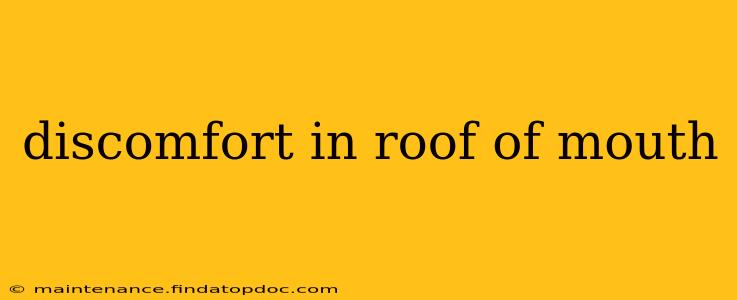Experiencing discomfort in the roof of your mouth, also known as the palate, can be unsettling. This area is sensitive, and a variety of factors can contribute to pain, tingling, or a general feeling of unease. This comprehensive guide will explore the potential causes of palate discomfort, accompanying symptoms, and effective treatment options. Understanding the root cause is crucial for effective management and relief.
What Causes Discomfort in the Roof of My Mouth?
Several factors can lead to discomfort in the roof of your mouth. These range from minor irritations to more serious underlying conditions. Let's delve into some of the most common culprits:
Mouth Injuries and Irritation:
- Burns: Hot food or drinks are a frequent cause of palate burns, leading to immediate and sometimes lingering pain. The severity of the burn dictates the duration and intensity of the discomfort.
- Cuts or Scrapes: Accidental injuries from sharp objects, such as hard candy or poorly fitting dentures, can cause cuts and sores on the palate.
- Irritation from Foods: Certain acidic or spicy foods can irritate the sensitive tissues of the palate, resulting in temporary discomfort.
Oral Health Issues:
- Canker Sores (Aphthous Ulcers): These small, painful ulcers often appear on the inside of the cheeks, lips, and tongue, but can also affect the palate. Their cause isn't fully understood, but stress, hormonal changes, and certain foods are thought to be contributing factors.
- Thrush (Oral Candidiasis): This fungal infection, caused by an overgrowth of Candida yeast, can manifest as white patches or redness on the palate, accompanied by burning or soreness. It's more common in individuals with weakened immune systems.
- Gum Disease (Gingivitis/Periodontitis): While primarily affecting the gums, advanced gum disease can sometimes lead to inflammation that extends to the palate.
Medical Conditions:
- Dry Mouth (Xerostomia): Reduced saliva production can leave the mouth dry and make the palate feel uncomfortable. This can be a side effect of certain medications or a symptom of underlying medical conditions.
- Allergies: Allergic reactions to certain foods or environmental allergens can sometimes manifest as oral discomfort, including palate irritation.
- Systemic Diseases: In rare cases, palate discomfort can be a symptom of underlying systemic diseases.
Other Potential Causes:
- Ill-fitting dentures: Poorly fitting dentures can rub against the palate, causing irritation and sores.
- Dental procedures: Some dental procedures, such as extractions or fillings, can cause temporary discomfort in the palate area.
What Are the Symptoms of Palate Discomfort?
Symptoms can vary depending on the underlying cause, but commonly include:
- Pain: This can range from mild tingling to severe, sharp pain.
- Burning sensation: A burning or stinging feeling on the palate is common with certain conditions like thrush or dry mouth.
- Redness: Inflammation often presents as redness or swelling of the palate tissues.
- Sores or ulcers: Open sores or ulcers can be painful and make eating and drinking difficult.
- White patches: These can be a sign of thrush or other fungal infections.
- Numbness or tingling: This may indicate nerve irritation or damage.
How is Discomfort in the Roof of My Mouth Treated?
Treatment depends entirely on the underlying cause. Here are some examples:
- For burns: Rinse your mouth with cool water and avoid hot foods and drinks. Over-the-counter pain relievers can help manage discomfort.
- For canker sores: Good oral hygiene is crucial. Over-the-counter topical treatments can help relieve pain and promote healing.
- For thrush: Antifungal medications, prescribed by a doctor, are necessary to treat this fungal infection.
- For dry mouth: Increase fluid intake, use saliva substitutes, and avoid alcohol and tobacco. Your doctor can also explore underlying causes and potential medications.
- For dentures: Adjustments may be needed by your dentist to ensure a proper fit.
When Should I See a Doctor?
Seek medical attention if:
- The discomfort is severe or persistent.
- You have difficulty eating or drinking.
- You notice significant swelling or redness.
- You have a fever or other systemic symptoms.
- The discomfort is accompanied by unusual bleeding.
Is Discomfort in the Roof of My Mouth Serious?
While many causes of palate discomfort are relatively minor and self-limiting, others can indicate more serious underlying health issues. Prompt diagnosis and appropriate treatment are essential to ensure comfort and prevent complications. It's always best to consult a healthcare professional for persistent or concerning symptoms.
This information is intended for general knowledge and informational purposes only, and does not constitute medical advice. It is essential to consult with a qualified healthcare professional for any health concerns or before making any decisions related to your health or treatment.
